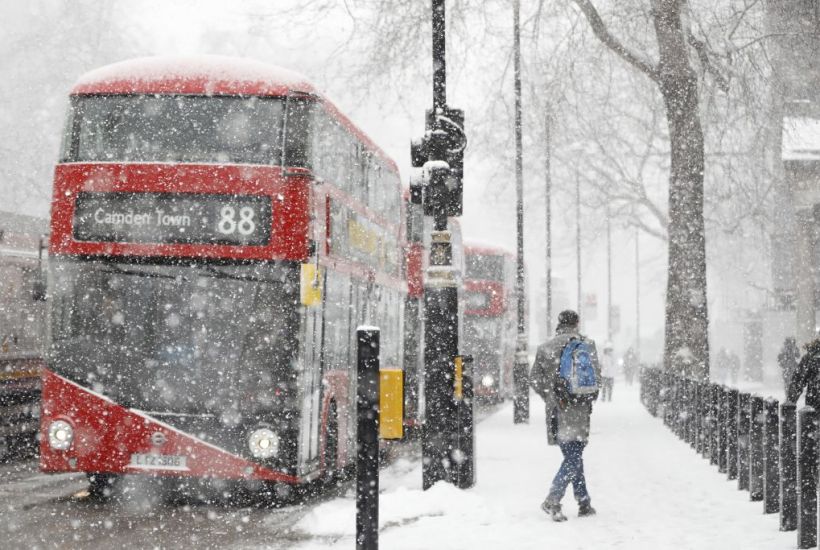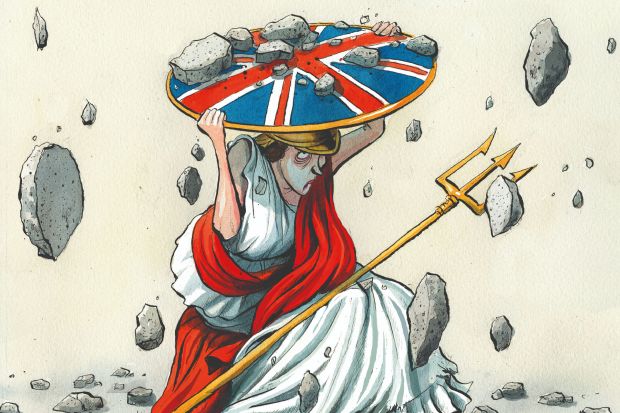If you’ve managed to avoid the dimly-lit pictures of people’s back gardens, you won’t have heard the news: the snow has arrived in the capital. The Foreign Secretary made a point of thanking London-based diplomats for showing up to his speech in Westminster yesterday – or, as he put it, ‘battling through’ two or three inches of snow to get there. James Cleverly had a point: St James’s Park next door was a veritable winter wonderland; Whitehall was now clear, but had received a generous covering of the white stuff the evening before, while the capital’s transport was as disrupted as it inevitably is during a ‘snow event’. This morning, the snow continues to cause chaos.
For readers outside London, let me apologise. Full-blown blizzards may be fairly regular visitors to the Scottish Highlands or the Welsh mountains between late November and early March, and we may all hear periodic warnings that the trans-Pennine motorway or the Snake Pass in the Derbyshire Peak District is impassable, but it is only when actual flakes fall in the vicinity of Trafalgar Square that snow becomes national news.
There is a reason, of course, why countries with serious winter are better at coping with it
With the all too predictable disruption come the recriminations. Why are the trains stuck in their sidings, the buses confined to their garages, the roads perilous with black ice, and so many people unable to get to their jobs? Why are we so bad at snow? Why can’t we be more like, say, Switzerland, where the trains run on time regardless? Or other parts of the Alps which function as normal as though there was no white stuff around at all?
Canada and the northern US states cope well through the winter, although even more people depend on cars than they do here. The caravans of gigantic snow-ploughs clearing the turnpikes are a set piece of American winters. Even countries not always known for their efficiency in other areas, manage to keep going after a snowfall. A real blizzard may bring life to a temporary halt, but once it has passed, everyone and everything – trains, drivers, services – pick up and carry on.
Indeed, in some countries people seem happier and everything seems actually to function better in frozen conditions. When I worked as a correspondent in Russia, you could sense the anxiety in the air if the first snow had not fallen by the end of November; if early December was snowless, too, this abnormality became a prime topic of conversation – and concern.
I also recall visiting the Ukrainian capital around a decade ago, amid reports of deep economic crisis, imminent financial default, general social collapse and record snowfall. Not only did the plane land safely and on time, but I was driven into central Kyiv along immaculately cleared roads, with the snow neatly piled up on either side. Whatever was failing in those generally happier times for Ukraine, it was not snow clearance. This could also be a reason why General Winter might not be quite the decisive factor in the Ukraine-Russia war, for either side, than those viewing the catastrophe from more temperate climes so fear.
There is a reason, of course, why countries with serious winter are better at coping with it: they have little choice. Their people and their economies depend on it, and they have learned how to do it. The investment in making buildings and transport winter-proof, or as winter-proof as possible, makes sound economic sense. And if the winter sports industry is important to your regional economy, you make sure people can get there, too.
That type of investment makes a lot less sense in countries or regions where winter, real winter, is less certain to happen, and is generally shorter-lived when it does. Why go to all the expense of buying and storing snow-clearing equipment, if its only outing is a couple of times a year, and sometimes not even that?
You can, of course, be dangerously wrongfooted, and not just in southern England. Living in Paris some years ago, I took what then seemed the reasonable decision to drive down to the south of Italy to spend New Year with family. The journey south was a continually glorious panorama, with the land of lemon orchards at its end. On the drive north, the snow started to fall outside Montpellier, the pass over the Cevennes was closed, and the motorway beside the Rhone was so slippery that even French drivers maintained a careful crawl. There was not a snowplough in sight.
Washington DC, for all its global significance, has its snow problems, too. Even the most prosperous suburbs can find themselves without power for days on end. The streets may eventually be cleared of snow, but city pavements are not a municipal responsibility, so in a harsh winter the packed snow becomes packed ice and unwalkable for days on end. Then again, Washington is a southern city, in climate, as in other ways, where air conditioning is a bigger contribution to liveability than snow clearance or protecting power cables underground.
The relatively low chance of heavy snow and long-lasting sub-zero temperatures is also why it makes sense for London and southern England not to invest taxpayers’ money in pre-empting winter. There is a need for far better insulation of buildings, and roads and pavements should be salted and gritted when a freeze is forecast. But the cost of more elaborate investment will surely outweigh the savings from keeping transport running and getting people to work – especially if the long-term trend is towards warming.
This December snowfall may have been less predicted, and less dramatic, than the snow that memorably blanketed London in 2009. Rather than revisit the grouses about official unpreparedness and public hedonism that multiplied then, however, maybe it is time to recognise that the popular instinct – to enjoy a ‘snow day’ – was right.
Make for the outside, take a picture of the fragile white world, build a snow-‘person’ and fight with snowballs; replace your scooter with skis and unearth that old sledge for the kids. Tomorrow, the trains will be running or back on strike, and the snow? Well, the snow will be gone.
The post It’s no surprise Britain can’t cope with snow appeared first on The Spectator.
Got something to add? Join the discussion and comment below.
Get 10 issues for just $10
Subscribe to The Spectator Australia today for the next 10 magazine issues, plus full online access, for just $10.




















Comments
Don't miss out
Join the conversation with other Spectator Australia readers. Subscribe to leave a comment.
SUBSCRIBEAlready a subscriber? Log in